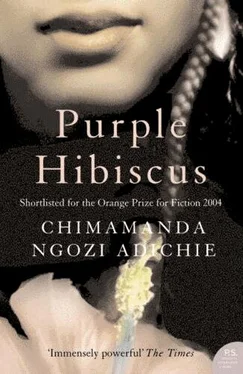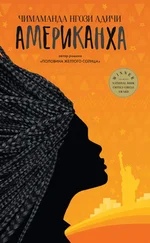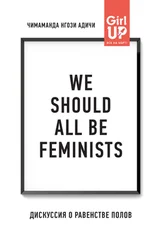Чимаманда Адичи - Purple hibiscus
Здесь есть возможность читать онлайн «Чимаманда Адичи - Purple hibiscus» — ознакомительный отрывок электронной книги совершенно бесплатно, а после прочтения отрывка купить полную версию. В некоторых случаях можно слушать аудио, скачать через торрент в формате fb2 и присутствует краткое содержание. Год выпуска: 2003, ISBN: 2003, Издательство: Algonquin Books of Chapel Hill, Жанр: Современная проза, на английском языке. Описание произведения, (предисловие) а так же отзывы посетителей доступны на портале библиотеки ЛибКат.
- Название:Purple hibiscus
- Автор:
- Издательство:Algonquin Books of Chapel Hill
- Жанр:
- Год:2003
- ISBN:1-56512-387-5
- Рейтинг книги:5 / 5. Голосов: 1
-
Избранное:Добавить в избранное
- Отзывы:
-
Ваша оценка:
- 100
- 1
- 2
- 3
- 4
- 5
Purple hibiscus: краткое содержание, описание и аннотация
Предлагаем к чтению аннотацию, описание, краткое содержание или предисловие (зависит от того, что написал сам автор книги «Purple hibiscus»). Если вы не нашли необходимую информацию о книге — напишите в комментариях, мы постараемся отыскать её.
Purple hibiscus — читать онлайн ознакомительный отрывок
Ниже представлен текст книги, разбитый по страницам. Система сохранения места последней прочитанной страницы, позволяет с удобством читать онлайн бесплатно книгу «Purple hibiscus», без необходимости каждый раз заново искать на чём Вы остановились. Поставьте закладку, и сможете в любой момент перейти на страницу, на которой закончили чтение.
Интервал:
Закладка:
"You mean we leave Nigeria in two weeks?" Amaka asked, shrilly.
"Am I a magician, eh?" Aunty Ifeoma retorted. The humor was lacking in her tone. There was nothing in her tone to speak of, really, except for fatigue. "I have to get the money for our tickets first. They are not cheap. I will have to ask your Uncle Eugene to help, so I think we will go to Enugu with Kambili and Jaja, perhaps next week. We will stay in Enugu until we are ready to leave, that will also give me an opportunity to talk to your Uncle Eugene about Kambili and Jaja going to boarding school."
Aunty Ifeoma turned to Jaja and me. "I will convince your father in any way I can. Father Amadi has offered to ask Father Benedict to talk to your father, too. I think it is the best thing for you both now, to go to school away from home."
I nodded. Jaja got up and walked into the flat. Finality hung in the air, heavy and hollow.
Father Amadi's last day sneaked up on me. He came in the morning, smelling of that masculine cologne I had come to smell even when he was not there, wearing the same boyish smile, wearing the same soutane. Obiora looked up at him and intoned, "From darkest Africa now come missionaries who will reconvert the West."
Father Amadi started to laugh. "Obiora, whoever gives you those heretical books should stop."
His laugh was the same, too. Nothing seemed to have changed about him, yet my new, fragile life was about to break into pieces. Anger suddenly filled me, constricting my air passages, pressing my nostrils shut. Anger was alien and refreshing. With my eyes, I traced the lines of his lips, the flare of his nose, as he spoke to Aunty Ifeoma and my cousins, all the while nursing my anger.
Finally, he asked me to walk him to the car. "I have to join the chaplaincy council members for lunch; they are cooking for me. But come and spend an hour or two with me, while I do the final cleaning up at the chaplaincy office," he said.
"No."
He stopped to stare at me. "Why?"
"No. I don't want to." I was standing with my back to his car.
He moved toward me and stood in front of me. "Kambili," he said. I wanted to ask him to say my name in a different way because he did not have the right to say it the old way. Nothing should be the same, was the same anymore. He was leaving.
I breathed through my mouth now. "The first day you took me to the stadium, did Aunty Ifeoma ask you to?" I asked.
"She was worried about you, that you could not hold a conversation with even the children upstairs. But she didn't ask me to take you." He reached out to straighten the sleeve of my shirt. "I wanted to take you. And after that first day, I wanted to take you with me every day."
I bent down to pick up a grass stalk, narrow like a green needle.
"Kambili," he said. "Look at me."
But I did not look at him. I kept my eyes on the grass in my hand as if it held a code I could decipher by concentrated staring, as if it could explain to me why I wished he had said he didn't want to take me even that first time so that I would have a reason to be angrier, so that I would not have this urge to cry and cry.
He climbed into his car and started it. "I will come back and see you this evening." I stared at his car until it disappeared down the slope that led to Ikejiani Avenue.
I was still staring when Amaka walked over to me. She placed her arm lightly on my shoulder. "Obiora says you must be having sex, or something close to sex, with Father Amadi. We have never seen Father Amadi look so bright-eyed." Amaka was laughing. I did not know whether or not she was serious. I did not want to dwell on how strange it felt discussing whether or not I had had sex with Father Amadi. "Maybe when we are in the university you will join me in agitating for optional celibacy in the priesthood?" Amaka asked. "Or maybe fornication should be permitted all priests once in a while. Say, once a month?"
"Amaka, please stop it." I turned and walked to the verandah.
"Do you want him to leave the priesthood?" Amaka sounded more serious now.
"He will never leave."
Amaka tilted her head thoughtfully, and then smiled. "You never know," she said, before walking into the living room.
I copied Father Amadi's German address over and over in my notebook. I was copying it again, trying at different writing styles, when he came back. He took the notebook from me and closed it. I wanted to say, "I will miss you" but instead I said, "I will write you."
"I will write you first," he said.
I did not know that tears slipped down my cheeks until Father Amadi reached out and wiped them away, running his open palm over my face. Then he enclosed me in his arms and held me.
Aunty Ifeoma cooked dinner for Father Amadi, and we all ate the rice and beans at the dining table. I knew that there was much laughter, much talk about the stadium and about remembering, but I did not feel that I was involved. I was busy locking little parts of me up, because I would not need them if Father Amadi was not here.
I did not sleep well that night; I tossed around so often that I woke Amaka up. I wanted to tell her about my dream where a man chased me down a rocky path littered with bruised allamanda leaves. First the man was Father Amadi, his soutane flying behind him, then it was Papa, in the floor-length gray sack he wore when he distributed ash on Ash Wednesday. But I didn't tell her. I let her hold and soothe me like a little child, until I fell asleep. I was glad to wake up, glad to see morning stream in through the window in shimmering strips the color of a ripe orange.
The packing was done; the hallway looked oddly big now that the bookshelves were gone. In Aunty Ifeoma's room, only a few things remained on the floor, the things we would use until we all left for Enugu: a bag of rice, a tin of milk, a tin of Bournvita. The other cartons and boxes and books had been cleared up or given away. When Aunty Ifeoma gave some clothes to the neighbors, the woman from the flat upstairs told her, "Mh, why won't you give me that blue dress you wear to church? After all, you will get more in America!" Aunty Ifeoma had narrowed her eyes, annoyed. I was not sure if it was because the woman was asking for the dress or because she had brought up America. But she did not give her the blue dress.
There was restlessness in the air now, as if we had all packed everything too quickly and too well and we needed something else to do. "We have fuel, let's go for a drive," Aunty Ifeoma suggested.
"A good-bye tour of Nsukka," Amaka said, with a wry smile.
We piled into the car. It swerved as Aunty Ifeoma turned onto the stretch of road bordered by the faculty of engineering, and I wondered if it would crash into the gutter and then Aunty Ifeoma would not get the fair rate she said a man in town had offered for it. She had also said that the money she would get for the car would pay only for Chima's ticket, which was half the full price of a ticket. Since my dream, the night before, I had had a feeling that something big would happen. Father Amadi would come back; it had to be what would happen. Maybe there was a mistake in his departure date; maybe he had postponed his trip. So as Aunty Ifeoma drove, I looked at the cars on the road, seeking Father Amadi, looking for that pastel-colored small Toyota. Aunty Ifeoma stopped at the foot of Odim hill and said, "Let's climb to the top."
I was surprised. I was not sure Aunty Ifeoma had planned to have us climb up the hill; it sounded like something she had said on impulse. Obiora suggested we have a picnic up the hill, and Aunty Ifeoma said it was a good idea. We drove to town and bought moi-moi and bottles of Ribena from Eastern Shop and then came back to the hill. The climb was easy because there were many zigzagging paths. There was a fresh smell in the air and, once in a while, a crackling in the long grass that bordered the paths. "The grasshoppers make that sound with their wings," Obiora said. He stopped by a mighty anthill, with ridges running across the red mud as if they were deliberate designs. "Amaka, you should paint something like this," he said. But Amaka did not respond; instead, she started to run up the hill. Chima ran after her. Jaja joined them.
Читать дальшеИнтервал:
Закладка:
Похожие книги на «Purple hibiscus»
Представляем Вашему вниманию похожие книги на «Purple hibiscus» списком для выбора. Мы отобрали схожую по названию и смыслу литературу в надежде предоставить читателям больше вариантов отыскать новые, интересные, ещё непрочитанные произведения.
Обсуждение, отзывы о книге «Purple hibiscus» и просто собственные мнения читателей. Оставьте ваши комментарии, напишите, что Вы думаете о произведении, его смысле или главных героях. Укажите что конкретно понравилось, а что нет, и почему Вы так считаете.






![О Генри - Пурпурное платье [The Purple Dress]](/books/405339/o-genri-purpurnoe-plate-the-purple-dress-thumb.webp)





